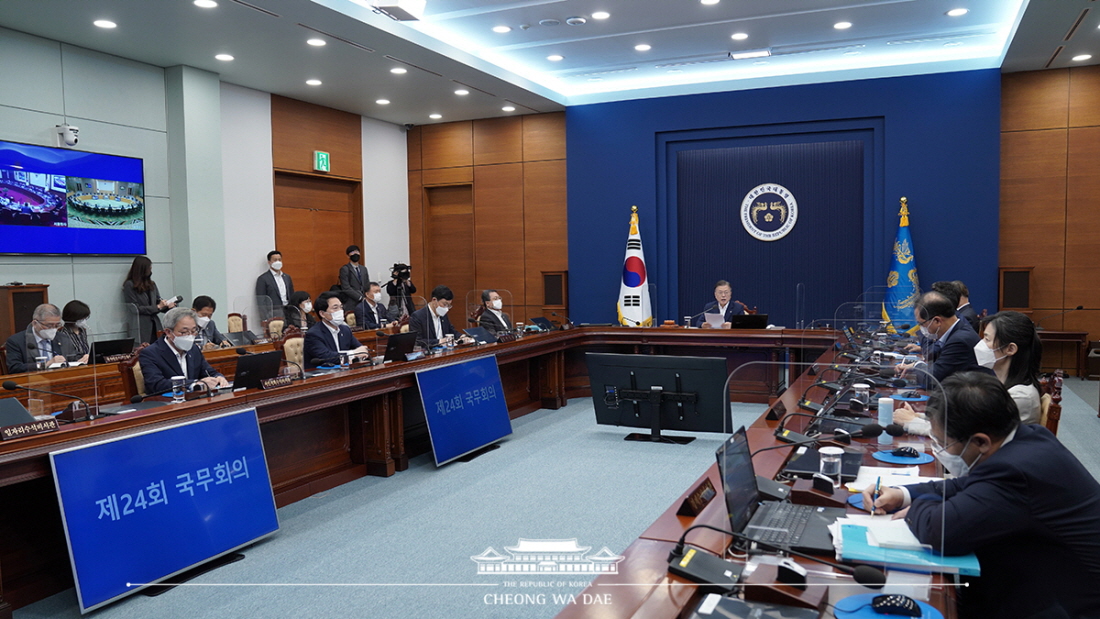이 웹사이트는 제19대 대통령 임기 종료에 따라 대통령기록관이 「대통령기록물 관리에 관한 법률」에 의해 이관받아 서비스하는 대통령기록물입니다. 자료의 열람만 가능하며 수정 · 추가 · 삭제는 불가능합니다.
다만, 「개인정보보호법」에 의하여 개인의 정보를 보호받기 원하시는 분은 관련 내용(요청자, 요청내용, 연락처, 글위치)을 대통령 웹기록물 담당자(044-211-2253)에게 요청해 주시면 신속히 검토하여 조치해 드리겠습니다. 감사합니다.
SPEECHES & REMARKS
BRIEFINGS

Let me begin the 24th Cabinet Meeting.
Following the Republic of Korea-United States summit that helped turn the ROK-U.S. alliance into a comprehensive global partnership, the P4G Seoul Summit was held successfully. Later this week, I will be attending the G7 Summit hosted by the United Kingdom. Korea being invited to the G7 Summit for two consecutive years indicates that our international standing has risen to a level on par with G7 members. My participation in the Summit itself will serve as a catalyst for upgrading our diplomacy.
Our country has developed into the ranks of the world’s top ten economies. Moreover, our culture, epidemic prevention and control, healthcare and medical services, civic awareness and other soft power areas have been highly praised around the world. I am very proud of this fact. As these achievements have been made by all of our people, I hope everyone will take pride in them as well.
Correspondingly, our responsibility and role in the international community have now grown even larger. We will take the G7 Summit as an opportunity to broaden our diplomatic horizons and enhance the role we play in resolving pending global issues. On the strength of our excellent biopharmaceutical production capacity, we will stress our role as a global vaccine hub. Also to be highlighted is our role as a bridging nation that spearheads cooperation between advanced and developing countries in response to the climate crisis. In addition, we will share experiences and accomplishments from Korea’s response to COVID-19 and the Korean New Deal initiative and, at the same time, promote our outstanding digital capabilities that can contribute to addressing pending global issues.
The upcoming G7 Summit represents not only the resumption of multilateral summits suspended since the COVID-19 outbreak but also an opportunity to actively engage in bilateral summit diplomacy with major countries. I hope the people will show it considerable attention and support.
For the first time in history, exports grew more than 40 percent for two consecutive months, and as of May, the shipbuilding industry’s orders for this year had already surpassed its total from last year. Domestic demand and consumption are being revived. As such, our economic recovery is accelerating. However, the morass of the prolonged COVID-19-induced recession is still casting extensive dark shadows.
Above all, polarization is a serious issue. While profits at top-ranked, listed companies and at the business lines benefitting from COVID-19 have sharply increased, the face-to-face service industry and others have been slow to recover. The polarization between these two is distinct. Polarization also runs deep in consumer spending. Department stores and large discount chains are recovering quickly. Purchases of luxury goods have increased significantly. In the meantime, spending at small neighborhood businesses run by the self-employed and by low-income households has yet to pick up. Culture-, art- and performance-related consumption is also mired in a serious slump.
Job polarization is another serious problem. The employment situation is improving rapidly, but difficulties facing young people and women persist. Numerous issues remain unresolved: labor market polarization, industrial accidents and protections for those in new forms of employment.
The Government must place top priority on resolving polarization and inequality and restoring the job market. Policies and financial support should be focused there as we recover from the COVID-19 pandemic. I ask you to do everything possible to achieve an inclusive economic recovery in which everyone can enjoy the warmth together. The greater-than-expected tax revenue should be used to fund a supplementary budget so that those businesses and the self-employed now struggling will regain vitality, spending by low-income households will pick up and the job recovery will quicken.
Our Government has worked painstakingly so far to minimize blind spots in labor protections by implementing related measures for platform workers and also by expanding the social safety net for the contract-based self-employed. At today’s Cabinet Meeting, we will promulgate a meaningful law that recognizes the legal status of domestic workers – the typical example of a profession that has existed in a social blind spot. I hope that this will serve as an opportunity to move a step further toward a society that respects labor.
As the number of double-income households increases, the demand for domestic service and family care providers has steadily increased. They have been part of our society’s service sector for a long time and account for a not-so-small portion of the economy. However, they have not been entitled to legal protections and have been subject to substandard working conditions. Now, domestic workers will be protected by labor-related laws and be eligible for social insurance benefits. The employers of domestic helpers can also anticipate high-quality, trusted services as the industry becomes standardized. Moreover, this will help female members of the workforce have uninterrupted careers and expand their participation in economic activities as well as contribute to new social service jobs. I ask relevant ministries and agencies to pay special attention and work hard, so the domestic service worker act can be quickly applied where it is most needed.



